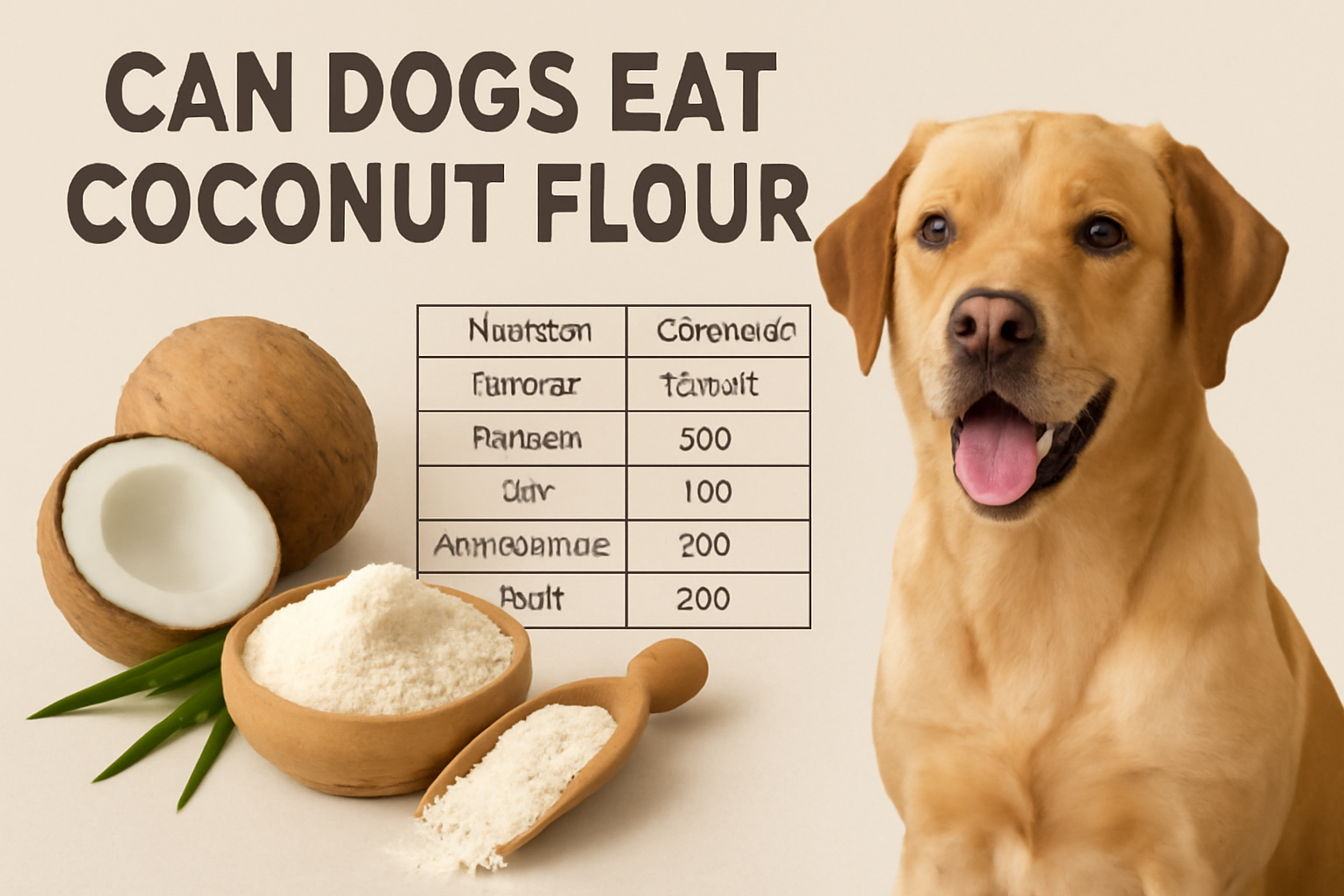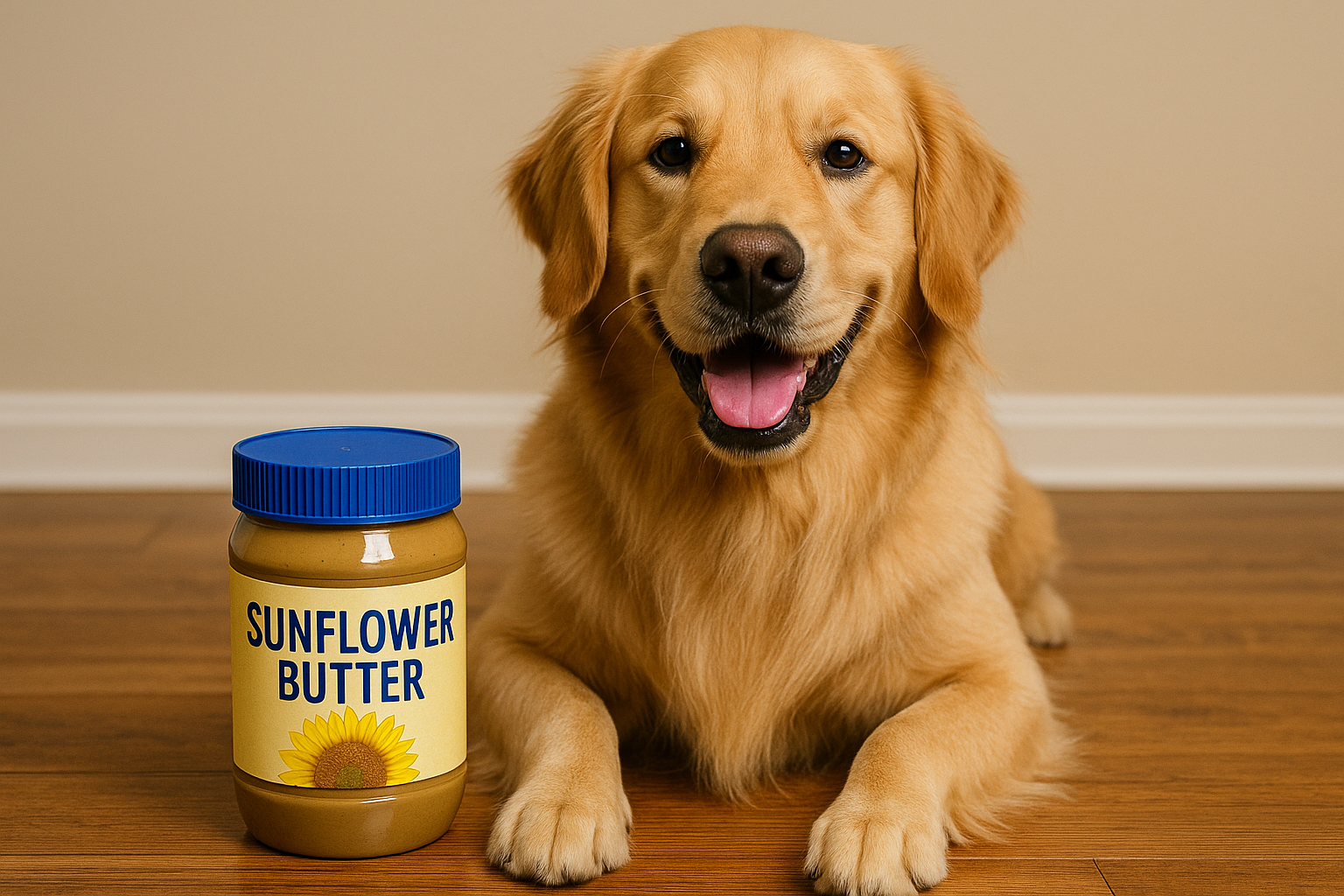Can Dogs Eat Coconut Flour? 🍞🐕
Introduction
Coconut flour is becoming a popular ingredient in many human recipes. It’s a gluten-free alternative to wheat flour, and some people use it for baking or making pancakes. But, if you are a dog owner, you might wonder: Can dogs eat coconut flour? 🐾
In this article, we’ll look at the benefits and risks of giving coconut flour to dogs, how much is safe, and whether it can be a healthy treat. Let’s dig in! 🐶
What is Coconut Flour? 🌴
Coconut flour is a product made from dried coconut meat. It’s soft, powdery, and commonly used in gluten-free baking. Unlike regular wheat flour, which contains gluten, coconut flour is gluten-free, making it a popular choice for people with gluten sensitivities.
The flour is made by grinding the dried coconut meat, which is then pressed to remove its oil. The result is a fine powder that has a mild coconut flavor. Some people even use it as a substitute for wheat flour in recipes like cakes, cookies, and pancakes.
But when it comes to dogs, is coconut flour safe for them? Let’s find out! 🐕👀
Can Dogs Eat Coconut Flour? 🐾🍴
The good news is yes, dogs can eat coconut flour in small amounts, and it is generally safe for them. Coconut flour is not toxic to dogs, so if you’re thinking about baking a special treat for your furry friend, coconut flour could be a good option.
However, just because it’s safe doesn’t mean it’s always the best choice. Dogs have different dietary needs from humans, so not all human foods are good for them, even if they are not harmful. 🐶🚫
Benefits of Coconut Flour for Dogs 🐕💪
- Gluten-Free
Coconut flour is naturally gluten-free, making it a great choice for dogs with gluten sensitivities or allergies. If your dog has a sensitive stomach or digestive issues, coconut flour can be a good alternative to regular wheat flour. - High in Fiber
Coconut flour is very high in fiber, which can help with digestion. Fiber helps keep your dog’s digestive system healthy and can prevent constipation. It can also help your dog feel fuller, which is useful for weight management. - Rich in Healthy Fats
Coconut flour contains healthy fats, which are beneficial for your dog’s skin and coat. These fats can help keep your dog’s fur shiny and smooth. They are also important for your dog’s overall health. - Contains Protein
Coconut flour contains some protein, which can contribute to your dog’s muscle growth and repair. However, it doesn’t have as much protein as meat, so it should not be relied on as a primary protein source. - Good Source of Manganese
Manganese is an important mineral that helps your dog’s body metabolize fats, carbohydrates, and proteins. It’s also vital for bone health and overall wellness.
Risks of Coconut Flour for Dogs ⚠️
While coconut flour has some health benefits for dogs, there are also risks to be aware of.
- High in Fiber
Too much fiber can cause digestive problems like gas, bloating, and diarrhea. Since coconut flour is very high in fiber, it’s important to only feed your dog small amounts. Giving your dog too much can lead to stomach upset. - Weight Gain
Coconut flour is high in calories. If you give your dog too many treats made with coconut flour, it could contribute to weight gain. Keep portion sizes small to avoid overfeeding. - Not a Complete Nutritional Source
Coconut flour lacks some of the essential nutrients that dogs need, such as vitamins, minerals, and protein. It’s best to think of coconut flour as a treat, not a meal replacement. Always provide a balanced diet for your dog. - Allergies or Sensitivities
While coconut flour is generally safe, some dogs might have allergies or sensitivities to coconut. If your dog has never had coconut before, start with a very small amount to see how they react.
How Much Coconut Flour Can Dogs Eat? 📏
When it comes to coconut flour, moderation is key. Dogs can have coconut flour, but it should only be an occasional treat.
For small dogs (under 15 pounds), start with 1/4 teaspoon of coconut flour in a treat. Larger dogs can have up to 1 tablespoon of coconut flour in a treat.
It’s important to monitor your dog’s reaction. If they experience any stomach upset, stop giving them coconut flour and consult your vet.
Nutritional Value of Coconut Flour 🌾🥥
Here’s a quick look at the nutritional value of coconut flour. This table shows the nutrients found in 1/4 cup (about 30g) of coconut flour.
| Nutrient | Amount per 1/4 cup (30g) |
|---|---|
| Calories | 120 kcal |
| Protein | 3g |
| Fat | 4g |
| Carbohydrates | 16g |
| Fiber | 10g |
| Sugar | 0g |
| Calcium | 10mg |
| Iron | 1.2mg |
| Magnesium | 25mg |
| Manganese | 0.4mg |
As you can see, coconut flour is high in fiber and fat, which is great for digestion and skin health. But it’s also calorie-dense, so keep portions small!
FAQ: Coconut Flour for Dogs 🤔🐕
1. Can coconut flour help my dog with weight loss?
Coconut flour’s high fiber content can help your dog feel full for longer, which can assist in weight management. However, because it’s also calorie-dense, you should be careful not to overfeed your dog with coconut flour-based treats.
2. Is coconut flour safe for puppies?
It’s best to wait until your puppy is at least six months old before introducing new foods like coconut flour. If you want to try coconut flour, start with a tiny amount to see how your puppy reacts.
3. Can I make dog treats with coconut flour?
Yes! You can use coconut flour to make homemade dog treats. Just be sure to follow a recipe designed for dogs, and keep the treats small and occasional.
4. What if my dog has a coconut allergy?
If your dog has a coconut allergy, you should avoid giving them coconut flour. Even if they haven’t shown an allergic reaction to other coconut products, it’s best to be cautious and consult your vet first.
5. Can coconut flour be used for dogs with sensitive stomachs?
Coconut flour can sometimes help dogs with sensitive stomachs because it is high in fiber and easy to digest. However, too much fiber can cause digestive upset, so start with small amounts and watch for any signs of discomfort.
6. Can I give my dog coconut flour every day?
It’s best to give coconut flour only as an occasional treat. Don’t make it a part of your dog’s regular diet. Always ensure they are getting a balanced meal that meets their nutritional needs.
Conclusion 🎉
Coconut flour can be a safe and healthy treat for your dog when given in moderation. It’s gluten-free, high in fiber, and packed with healthy fats, which can benefit your dog’s digestive health and skin. However, due to its high calorie and fiber content, you should always serve it in small amounts.
If you decide to make treats for your dog with coconut flour, be sure to follow a dog-safe recipe and keep portions small. And always watch for any signs of allergies or digestive upset! 🐶
Remember, before adding anything new to your dog’s diet, it’s always a good idea to consult your vet. They can provide guidance on how to keep your dog healthy and happy. 🐾🐕
This article should help you understand whether coconut flour is safe for your dog and how to use it responsibly. Enjoy baking for your furry friend! 🎂🐕




